状语从句(精讲精练)分析
- 格式:doc
- 大小:123.50 KB
- 文档页数:10
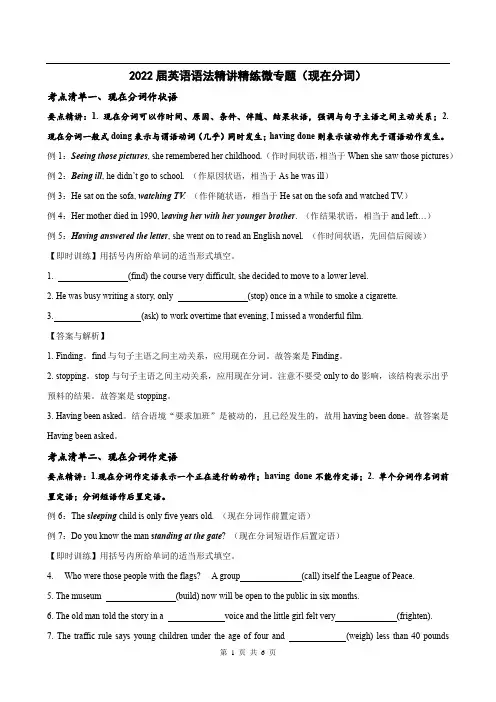
2022届英语语法精讲精练微专题(现在分词)考点清单一、现在分词作状语要点精讲:1. 现在分词可以作时间、原因、条件、伴随、结果状语,强调与句子主语之间主动关系;2.现在分词一般式doing表示与谓语动词(几乎)同时发生;having done则表示该动作先于谓语动作发生。
例1:Seeing those pictures, she remembered her childhood.(作时间状语,相当于When she saw those pictures)例2:Being ill, he didn’t go to school. (作原因状语,相当于As he was ill)例3:He sat on the sofa, watching TV.(作伴随状语,相当于He sat on the sofa and watched TV.)例4:Her mother died in 1990, l eaving her with her younger brother. (作结果状语,相当于and left…)例5:Having answered the letter, she went on to read an English novel. (作时间状语,先回信后阅读)【即时训练】用括号内所给单词的适当形式填空。
1. (find) the course very difficult, she decided to move to a lower level.2. He was busy writing a story, only (stop) once in a while to smoke a cigarette.3. (ask) to work overtime that evening, I missed a wonderful film.【答案与解析】1. Finding。
find与句子主语之间主动关系,应用现在分词。
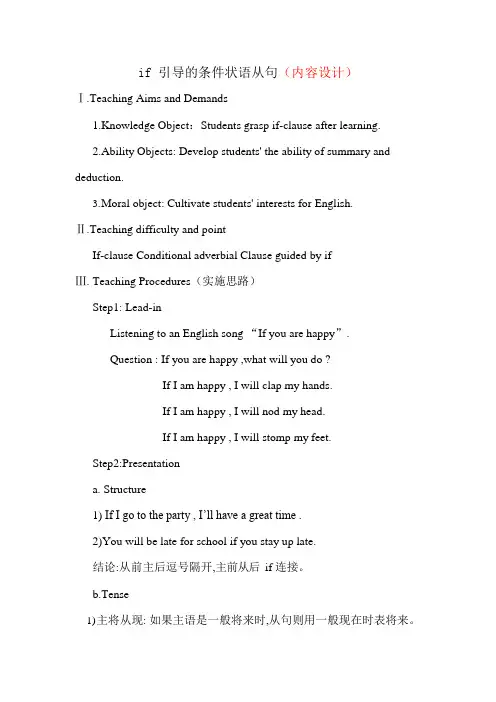
if 引导的条件状语从句(内容设计)Ⅰ.Teaching Aims and Demands1.Knowledge Object:Students grasp if-clause after learning.2.Ability Objects: Develop students' the ability of summary and deduction.3.M oral object: Cultivate students' interests for English.Ⅱ.Teaching difficulty and pointIf-clause Conditional adverbial Clause guided by ifⅢ. Teaching Procedures(实施思路)Step1: Lead-inListening to an English song “If you are happy”.Question : If you are happy ,what will you do ?If I am happy , I will clap my hands.If I am happy , I will nod my head.If I am happy , I will stomp my feet.Step2:Presentationa. Structure1)If I go to the party , I’ll have a great time .2)Y ou will be late for school if you stay up late.结论:从前主后逗号隔开,主前从后if 连接。
b.Tense1)主将从现: 如果主语是一般将来时,从句则用一般现在时表将来。
Eg : If it rains tomorrow I will stay at home.2)主情从现:主句含有must,may,can 等情态动词,从句用一般现在时表将来。
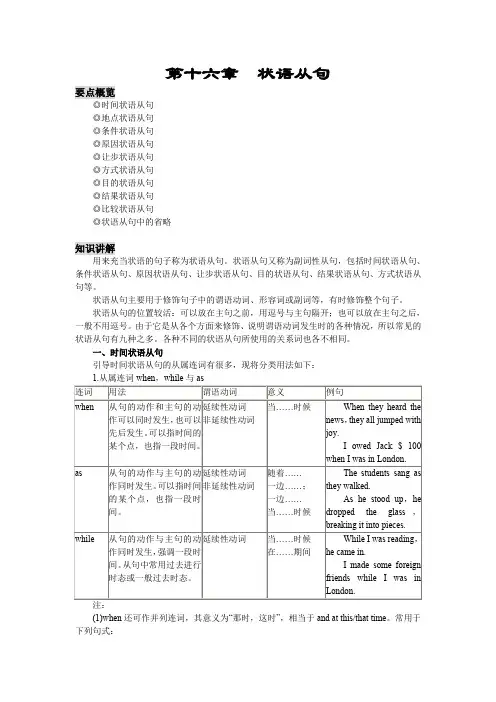
第十六章状语从句要点概览◎时间状语从句◎地点状语从句◎条件状语从句◎原因状语从句◎让步状语从句◎方式状语从句◎目的状语从句◎结果状语从句◎比较状语从句◎状语从句中的省略知识讲解用来充当状语的句子称为状语从句。
状语从句又称为副词性从句,包括时间状语从句、条件状语从句、原因状语从句、让步状语从句、目的状语从句、结果状语从句、方式状语从句等。
状语从句主要用于修饰句子中的谓语动词、形容词或副词等,有时修饰整个句子。
状语从句的位置较活:可以放在主句之前,用逗号与主句隔开;也可以放在主句之后,一般不用逗号。
由于它是从各个方面来修饰、说明谓语动词发生时的各种情况,所以常见的状语从句有九种之多。
各种不同的状语从句所使用的关系词也各不相同。
一、时间状语从句引导时间状语从句的从属连词有很多,现将分类用法如下:注:(1)when还可作并列连词,其意义为“那时,这时”,相当于and at this/that time。
常用于下列句式:sb.was doing sth.when...某人正在干某事就在这时……sb.was about to/ going to do sth.when...某人正打算干某事就在这时……sb. has just done sth. when. . . 某人刚干了某事就在这时……(2)when还表示原因“既然”。
如:It was foolish of you to take a taxi when you could easily walk here in five minutes. 既然你可以步行五分钟就能到这儿,坐出租车来真是愚蠢。
(3)while作为并列连词,意为“而,却”,表示对比。
He likes pop music,while I am fond of folk music.他喜欢流行音乐,而我却喜欢民间音乐。
(4)如果主句表示的是短暂动作,而从句用延续性动词的进行时态表示在一段时间内正在进行的动作时,when,while与as可互换使用。
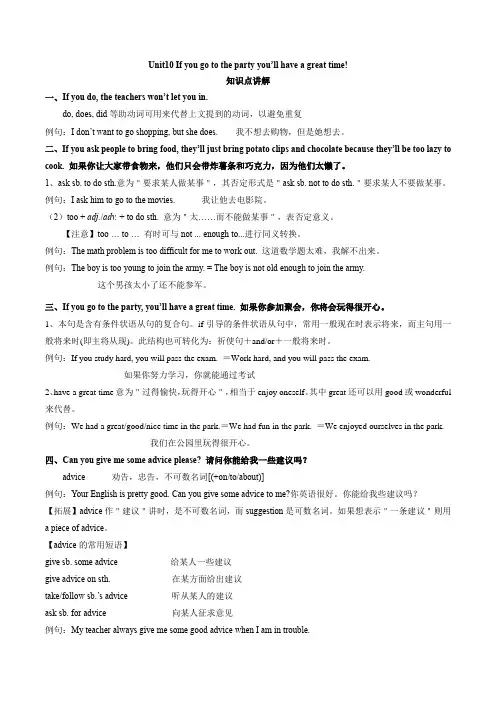
Unit10 If you go to the party you’ll have a great time!知识点讲解一、If you do, the teachers won’t let you in.do, does, did等助动词可用来代替上文提到的动词,以避免重复例句:I don’t want to go shopping, but she does. 我不想去购物,但是她想去。
二、If you ask people to bring food, they’ll just bring potato clips and chocolate because they’ll be too lazy to cook. 如果你让大家带食物来,他们只会带炸薯条和巧克力,因为他们太懒了。
1、ask sb. to do sth.意为"要求某人做某事",其否定形式是"ask sb. not to do sth."要求某人不要做某事。
例句:I ask him to go to the movies. 我让他去电影院。
(2)too + adj./adv. + to do sth. 意为"太……而不能做某事",表否定意义。
【注意】too … to … 有时可与not ... enough to...进行同义转换。
例句:The math problem is too difficult for me to work out. 这道数学题太难,我解不出来。
例句:The boy is too young to join the army. = The boy is not old enough to join the army.这个男孩太小了还不能参军。
三、If you go to the party, you’ll have a great time. 如果你参加聚会,你将会玩得很开心。
1、本句是含有条件状语从句的复合句。
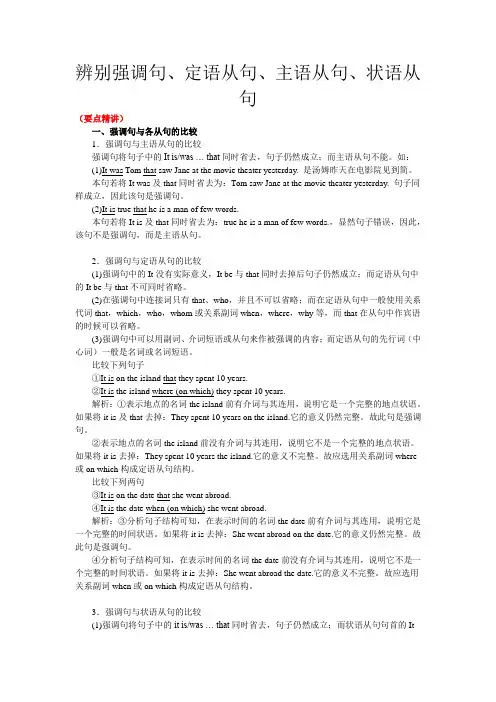
辨别强调句、定语从句、主语从句、状语从句(要点精讲)一、强调句与各从句的比较1.强调句与主语从句的比较强调句将句子中的It is/was … that同时省去,句子仍然成立;而主语从句不能。
如:(1)It was Tom that saw Jane at the movie theater yesterday. 是汤姆昨天在电影院见到简。
本句若将It was及that同时省去为:Tom saw Jane at the movie theater yesterday. 句子同样成立,因此该句是强调句。
(2)It is true that he is a man of few words.本句若将It is及that同时省去为:true he is a man of few words.,显然句子错误,因此,该句不是强调句,而是主语从句。
2.强调句与定语从句的比较(1)强调句中的It没有实际意义,It be与that同时去掉后句子仍然成立;而定语从句中的It be与that不可同时省略。
(2)在强调句中连接词只有that、who,并且不可以省略;而在定语从句中一般使用关系代词that,which,who,whom或关系副词when,where,why等,而that在从句中作宾语的时候可以省略。
(3)强调句中可以用副词、介词短语或从句来作被强调的内容;而定语从句的先行词(中心词)一般是名词或名词短语。
比较下列句子①It is on the island that they spent 10 years.②It is the island where (on which) they spent 10 years.解析:①表示地点的名词the island前有介词与其连用,说明它是一个完整的地点状语。
如果将it is及that去掉:They spent 10 years on the island.它的意义仍然完整。
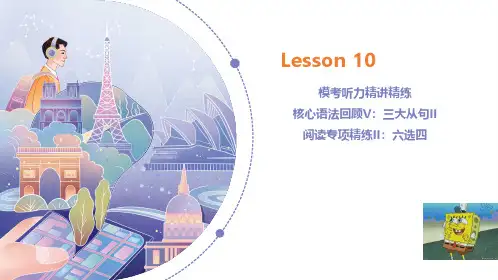
模考听力精讲精练核心语法回顾V :三大从句II阅读专项精练II :六选Lesson 10 四本讲目录模考听力精讲精练模考听力短对话讲解模考听力长对话训练核心语法回顾V:三大从句II最难的状从来了你怕吗?阅读专项精练II:六选四(A) What Is Nonverbal Communication?(B) Motivating Employees under Unfavorable ConditionsQuiz: Why you should not worry about procrastination听力能力提升听力只能练!练!练!解题指导☞听力短对话作答听力短对话时,常见问题如下:,仔细辨别题目中可能存在的②需在加以克服。
③缺乏综合策略:考生纠结于部分无法确定答案的题目,影响后续题目的正常作答。
由于短对话文本与问题只播放一遍,即使某一题无法明确答案,仍需紧跟听力内容保持作答节奏6. A. Get a new bus schedule. B. Read the notice on the window.C. Go and ask the ticket seller.D. Board the bus to Cleveland.Annie提示:Short ConversationsW: Oh, that wasn’t me. That was my sister Jane. She’s in your class.Q: What does the woman mean?Annie再次提示:Short Conversations的选项中如出现第三位人物(the man/the woman之外), 务必理清人物关系与评价。
8.took overB. He is making plans to expand his operation.M: Fifteen years if you can believe that. I bought it from a small operation to what it is today.Q: What do we learn about the man?PHRASAL VERB If you take over a company, you getcontrol of it, for example, by buying its shares. 接管(公司)9. A. The man and the woman are working on a joint project.B. The woman is going to make her topic more focused.C. It took a lot of time to get the man on the right track.D. One should choose a broad topic for a research paper.M: You are on the right track. I just think you need to narrow the topic down.W: Yeah, you’re right. I always start by choosing too broad a topic when I’m doing a research paper.Q: What do we learn from the conversation?图片来自网络,侵权请联系删除10.B. The woman’s kids can play football with his son.C. Many children feel bored when left alone.look forward to it all week.Q: What does the man mean?Annie再次提示:Short Conversations那么,这套听力短对话带给我们什么了呢?Annie提示1:任何题型中的but/yet/however后往往为重点所在,听力短对话尤其如此。
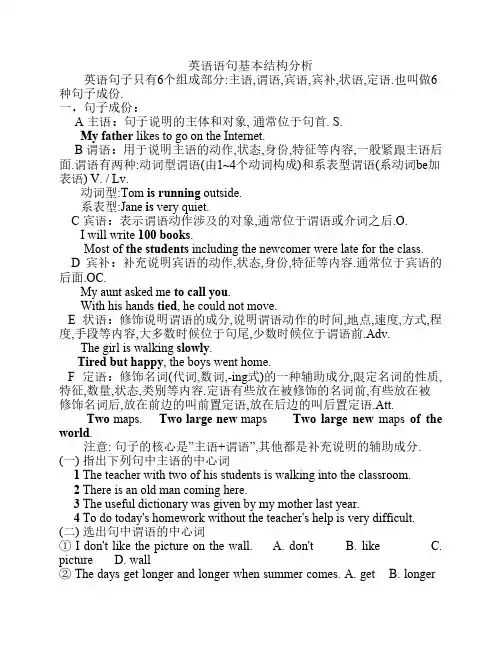
英语语句基本结构分析英语句子只有6个组成部分:主语,谓语,宾语,宾补,状语,定语.也叫做6种句子成份.一,句子成份:A 主语:句子说明的主体和对象, 通常位于句首. S.My father likes to go on the Internet.B 谓语:用于说明主语的动作,状态,身份,特征等内容,一般紧跟主语后面.谓语有两种:动词型谓语(由1~4个动词构成)和系表型谓语(系动词be加表语) V. / Lv.动词型:Tom is running outside.系表型:Jane is very quiet.C 宾语:表示谓语动作涉及的对象,通常位于谓语或介词之后.O.I will write 100 books.Most of the students including the newcomer were late for the class.D 宾补:补充说明宾语的动作,状态,身份,特征等内容.通常位于宾语的后面.OC.My aunt asked me to call you.With his hands tied, he could not move.E 状语:修饰说明谓语的成分,说明谓语动作的时间,地点,速度,方式,程度,手段等内容,大多数时候位于句尾,少数时候位于谓语前.Adv.The girl is walking slowly.Tired but happy, the boys went home.F 定语:修饰名词(代词,数词,-ing式)的一种辅助成分,限定名词的性质,特征,数量,状态,类别等内容.定语有些放在被修饰的名词前,有些放在被修饰名词后,放在前边的叫前置定语,放在后边的叫后置定语.Att.Two maps. Two large new maps Two large new maps of the world.注意: 句子的核心是”主语+谓语”,其他都是补充说明的辅助成分.(一) 指出下列句中主语的中心词1 The teacher with two of his students is walking into the classroom.2 There is an old man coming here.3 The useful dictionary was given by my mother last year.4 To do today's homework without the teacher's help is very difficult.(二) 选出句中谓语的中心词① I don't like the picture on the wall. A. don't B. like C. picture D. wall② The days get longer and longer when summer comes. A. get B. longerC. daysD. summer③ Do you usually go to school by bus? A. Do B. usually C. go D. bus④ There will be a meeting at the library this afternoon.A. will beB. meetingC. the libraryD. afternoon⑤ Did the twins have porridge for their breakfast? A. Did B. twins C. have D. breakfast⑥ Tom didn't do his homework yesterday. A. Tom B. didn't C. do D. his homework⑦ What I want to tell you is this. A. want B. to tell C. youD. is⑧ We had better send for a doctor. A. We B. had C. sendD. doctor⑨ He is interested in music. A. is B. interested C. in D. music⑩ Whom did you give my book to? A. give B. did C. whomD. book(三) 挑出下列句中的宾语① My brother hasn't done his homework. ② People all over the world speak English. ③You must pay good attention to your pronunciation. ① She likes the children to read newspapers and books in the reading-room.② He asked her to take the boy out of school. ③ She found it difficult to do the work.④ They call me Lily sometimes. ⑤ I saw Mr Wang get on the bus.⑥Did you see Li Ming playing football on the playground just now? (七) 挑出下列句中的状语① There was a big smile on her face. ② Every night he heard the noise upstairs. ③ He began to learn English when he was eleven.④ The man on the motorbike was travelling to fast.⑤ With the medicine box under her arm, Miss Li hurried off. ⑥ She loves the library because she loves books. ⑦ I am afraid that if you've lost it, you must pay for it.⑧ The students followed Uncle Wang to see the other machine. (八) 划出句中的直接宾语和间接宾语① Please tell us a story. ②My father bought a new bike for me last week.③ Mr Li is going to teach us history next term. ④ Here is a pen.Give it to Tom.⑤ Did he leave any message for me?二,句子结构:A 主谓宾结构:1、主语:可以作主语的成分有名词(如boy),主格代词(如you),数词,动词不定式,动名词, 主语从句等。
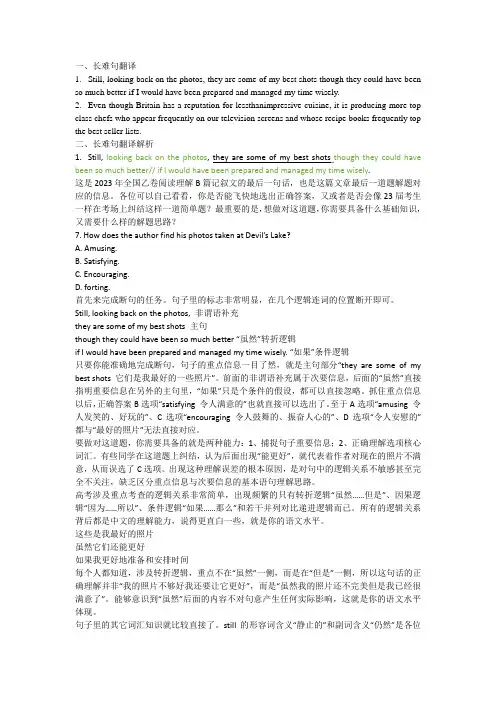
一、长难句翻译1.Still, looking back on the photos, they are some of my best shots though they could have been so much better if I would have been prepared and managed my time wisely.2.Even though Britain has a reputation for lessthanimpressive cuisine, it is producing more top class chefs who appear frequently on our television screens and whose recipe books frequently top the best seller lists.二、长难句翻译解析1.Still, looking back on the photos, they are some of my best shots though they could have been so much better// if I would have been prepared and managed my time wisely.这是2023年全国乙卷阅读理解B篇记叙文的最后一句话,也是这篇文章最后一道题解题对应的信息。
各位可以自己看看,你是否能飞快地选出正确答案,又或者是否会像23届考生一样在考场上纠结这样一道简单题?最重要的是,想做对这道题,你需要具备什么基础知识,又需要什么样的解题思路?7. How does the author find his photos taken at Devil’s Lake?A. Amusing.B. Satisfying.C. Encouraging.D. forting.首先来完成断句的任务。

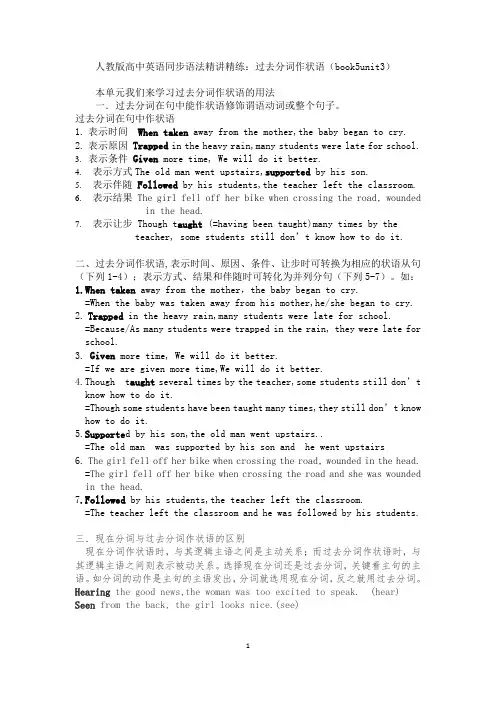
人教版高中英语同步语法精讲精练:过去分词作状语(book5unit3)本单元我们来学习过去分词作状语的用法一.过去分词在句中能作状语修饰谓语动词或整个句子。
过去分词在句中作状语1.表示时间When taken away from the mother,the baby began to cry.2.表示原因Trapped in the heavy rain,many students were late for school.3.表示条件 Given more time, We will do it better.4.表示方式The old man went upstairs,supported by his son.5.表示伴随 Followed by his students,the teacher left the classroom.6.表示结果The girl fell off her bike when crossing the road, woundedin the head.7.表示让步 Though t aught (=having been taught)many times by theteacher, some students still don’t know how to do it.二、过去分词作状语, 表示时间、原因、条件、让步时可转换为相应的状语从句(下列1-4);表示方式、结果和伴随时可转化为并列分句(下列5-7)。
如:1.When taken away from the mother,the baby began to cry.=When the baby was taken away from his mother,he/she began to cry. 2.Trapped in the heavy rain,many students were late for school.=Because/As many students were trapped in the rain, they were late for school.3. Given more time, We will do it better.=If we are given more time,We will do it better.4.Though t aught several times by the teacher,some students still don’t know how to do it.=Though some students have been taught many times,they still don’t know how to do it.5.Supporte d by his son,the old man went upstairs..=The old man was supported by his son and he went upstairs6. The girl fell off her bike when crossing the road, wounded in the head.=The girl fell off her bike when crossing the road and she was woundedin the head.7.Followed by his students,the teacher left the classroom.=The teacher left the classroom and he was followed by his students.三.现在分词与过去分词作状语的区别现在分词作状语时,与其逻辑主语之间是主动关系;而过去分词作状语时,与其逻辑主语之间则表示被动关系。
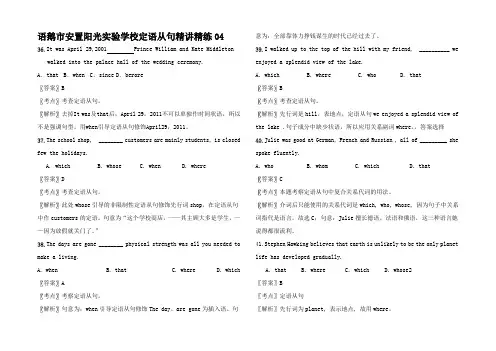
语鹅市安置阳光实验学校定语从句精讲精练04It was April 29,2001 Prince William and Kate Middleton walked into the palace hall of the wedding ceremony.A.that B.when C.since D.berore答案B考点考查定语从句。
解析去掉It was及that后,April 29,2011不可以单独作时间状语,所以不是强调句型。
用when引导定语从句修饰April29,2011。
The school shop, ________ customers are mainly students, is closed few the holidays.A. whichB. whoseC. whenD. where答案D考点考查定语从句。
解析此处whose引导的非限制性定语从句修饰先行词shop,在定语从句中作customers的定语。
句意为“这个学校商店,——其主顾大多是学生,——因为放假就关门了。
”The days are gone ________ physical strength was all you needed to make a living.A. whenB. thatC. whereD. which答案A考点考察定语从句。
解析句意为:when引导定语从句修饰The day。
are gone为插入语。
句意为:全部靠体力挣钱谋生的时代已经过去了。
I walked up to the top of the hill with my friend, __________ we enjoyed a splendid view of the lake.A. whichB. whereC. whoD. that答案B考点考查定语从句。
解析先行词是hill,表地点,定语从句we enjoyed a splendid view ofthe lake .句子成分中缺少状语,所以应用关系副词where。
应对区爱护学校高考英语语法核心考点专项复习11:状语从句从句是学生们很头疼的一个难题,也是高考的必考点。
其中包括名词性从句、定语从句、状语从句。
状语从句也是高考的重点,内容多、考点多。
本专题主要讲解状语从句的分类、连接词、考点,并配以习题练习。
概述:状语从句在复合句中作状语。
根据句子的含义,它可表示时间、地点、原因、目的、结果、条件、行为方式、比较、让步等。
状语从句通常由一个连词引导,有时由一个起连词作用的词组引导。
目的:掌握从句的连接词和用法,能够识别出从句,学会分析从句的结构。
一、时间状语从句(1)表示时间的状语从句可以由when,whenever,as,while,before,until,ever since,as soon as 等词引导。
As a young man (=When he was a young man),he was fond of hunting.他年轻时,喜欢打猎。
When the rain stopped,students rushed out of the classroom.雨停了,学生们冲出教室。
My mother was cooking while I was doing my homework.我做作业时母亲在做饭。
We were about to set off when it suddenly began to rain.我们刚要出发,突然下起雨来。
It will be half a year before I come back.我半年之后才回来。
(2)名词词组引导时间状语从句:every/each time每一次;the moment/minute那时(一……就……);the first/second time 第一/二次;the last time最后一次;the day那一天;the week那一周等。
Every time I see him,he looks miserable.每次我看见他,他都是一副愁眉苦脸的样子。
状语从句用法详解一、时间状语从句A. when, while, as, whenever;when, while, as表示主句谓语作和从句的谓语动作同时发生或几乎同时发生。
1.when①when表示点时间时,从句中用短暂性动词;表示段时间时,用持续性动词。
When I got home, my family were already having dinner.我到家的时候,全家已在吃晚饭。
【注意】当when意思是正当……时候(and at that moment)时,when只能跟在前一分句之后。
He was about to go to bed when the doorbel rang. 他正要上床,忽然门铃响了。
They were watching the World Cup when suddenly the lights went out. 他们正看着世界杯比赛,突然灯灭了。
They had just arrived home when it began to rain. 他们刚到家,天就开始下雨了。
2.while①while通常表示一段时间,从句中宜用持续性动词作谓语。
Strike while the iron is hot.趁热打铁。
She fell asleep while she was reading the newspaper. 她在看报的时候睡着了。
②while有时可以作并列连词,表示对比,可译成……而……。
I am fond of English while he likes math. 我喜欢英语而他却喜欢数学。
We slept while the captain kept watch. 我们睡觉而上尉担任警戒。
③while有时可引导让步状语从句,意思是虽然。
While they love the children, they are strict with them. 虽然他们都爱他们的孩子,但却对他们要求严格。
3.as①as表示一边……一边……,强调从句和主句中两个动作交替进行或同步进行。
They talked as they walked.他们边走边聊。
②as表示随着,此用法不用when或while替代。
As time goes on, it's getting warmer and warmer. 随着时间的推移,天气变得越来越暖了。
4.wheneverwhenever是when的强势语,它描述的不是一次性动作,而是经常发生的习惯性动作。
You are always welcome whenever you come. 无论你何时来都欢迎。
Whenever we met with difficulties, they came to help us. 每当我们遇上困难的时候,他们就来帮我们。
B. before, after1.before表示在一段时间之前。
I must finish all the work before I go home. 回家之前我必须干完所有的活。
He had learned English for three years before he went to London. 他去伦敦之前已学了三年英语。
提示: before 从句往往带有否定的含义,常译为:还没等到….就….;还没来得及…就……作此意时,从句中常见情态动词can/ could。
He ran off before I could stop him. 我还没来得及阻止他,他就跑掉了。
The man hung up the phone before I could answer it.我没坐多久他就回来了。
Before I could get in a word, he measured me. 我还来得及插话,他就给我量好了尺寸。
【必背】before 常用句型①It will be + 时间段+before+ 一般现在时:要等多久才…….It will be five years before we meet again.五年以后我们才能再见。
②It won’t be long before+ 一般现在时:等不了多久就会……It will not be long before you regret what you have done.不用过多久你就会对你所作所为感到后悔的。
③It was +时间段+before +一般过去时:等了多久就……It was minutes before the police arrived. 过了几分钟警察才到。
④It wasn’t long before+ 一般过去时:没等多久就……It was not long before I realized I was wrong. 不久我就意识到我错了。
【对比】It is/ has been +时间段+since +一般过去时:自从……以来到现在已经有多长时间It is three years since the war broke out. 战争爆发以来已有三年。
2.after表在一段时间之后。
Let's play football after school is over. 放学后我们踢足球吧。
The sun came out soon after the storm stopped. 暴风雨过后不久,太阳出来了。
C.till, until1.until /till用于肯定句时,表示直到为止,主句必须为持续性动词。
We shall wait until till he comes back.我们将一直等到他回来。
(注意它们的拼写)Everything went well until till that accident happened.直到发生那意外之前,一切都正常。
2.Not……until ……表示直到……才……,主句通常要用短暂动词I didn't leave until she came back.直到她回来,我才离开的。
I could hardly understand the theory until my teacher explained it to me.直到老师向我解释我才理解了那个理论。
必背:①not until句型的倒装句:当not until位于句首时,主句中的主语、谓语要使用倒装语序。
(Not until…+助动词+主语+ 其他)Not until she stopped crying did I leave.直到她不哭了,我才离开的。
②not until 句型的强调句:句型(It is/ was not until…….that……)It was not until she took off her dark glasses that I recognized her.直到她摘下墨镜,我才认出她。
D.sincesince自……以来。
主句中通常现在完成时,since从句一般过去时。
Where have you been since I last saw you自上次我见过你之后,你去了哪里?Since she was young, she has been collecting stamps.她自年轻时起就一直集邮至今。
It is three years since he began to smoke.他开始抽烟到现在已三年了。
E.as soon asas soon as...可译为一……就……,用来表示主从句的动作是紧接着发生的。
He rushed home as soon as he got the good news.他一得到这个好消息就奔回家。
【必背】一……就……还可以用on /upon doing 结构来表示。
On arriving home he called up Lester.=As soon as he arrived home, he called up Lester.他一到家就给莱斯特打电话F.hardly …when…, no sooner…than…这两个短语都表示刚……就……,可以互换,主句通常用去完成时。
He had no sooner started out than he felt homesick.他刚出发就想起家来。
He had hardly started his speech when someone rose to refute his points.他刚开始发言,就有人站起来反驳他的论点。
【注意】当hardly(=scarcely), no sooner 位于句子的开头时,主句须用倒装语序。
Hardly had she fallen asleep when a knock at the door woke her up. 她刚要睡着,忽然敲门声把她吵醒。
No sooner was the frost off the ground than the work began. 地上的霜一消散,人们就开始工作了。
G.onceonce作连词时,也相当于as soon as,但它含有的条件意味更浓,它引导的从句较短。
Once you begin, you must continue. 一旦开了头,你就应当继续下去。
Once you see him, you will never forget him. 你一旦见过他,就不会忘了他的。
1.We were swimming in the lake_____suddenly the storm started.A.whenB.whileC.untilD.before2.It was evening____ we reached the little town of Winchester.A.thatB.untilC.sinceD.before3.You can eat food free in my restaurant_____you like.A.wheneverB.whereverC.whateverD.however4.Scientists say it may be five or six years______it is possible to test this medicine on human patients.A.sinceB.afterC.beforeD.when5.We told that we should follow the main road_____we reached the central railway station.A.wheneverB.untilC.whileD.wherever6.It is almost five years____we saw each other last time.A.beforeB.sinceC.afterD.when7.Simon thought his computer was broken______his little brother pointed out that he had forgotten to turn it on.A.untilB.unlessC.afterD.because8.The American Civil War lasted four years_____the North won in the end.A.afterB.beforeC.whenD.then9.--Did Jack come back early last night?--Yes.It was not yet eight o'clock_____he arrived home.A.beforeB.whenC.thatD.until10.“You can't have this football back_____you promise not to kick it at my cat again.”the old man said firmly.A.becauseB.sinceC.whenD.until11.I had just stepped out of the bathroom and was busily drying myself with a towel____I heard the steps.A.whileB.whenC.sinceD.after12.--How long do you think it will be___China sends a manned spaceship to the moon?--Perhaps two or three years.A.whenB.untilC.thatD.before13.--Why didn't you tell him about the meeting?--He rushed out of the room____I could say a word.A.beforeB.untilC.whenD.after二、地点状语从句地点状语从句通常由where, wherever(where的强势语)A. wherewhere 在……地方,去……地方Where I live there are plenty of trees. 我住的地方树很多。